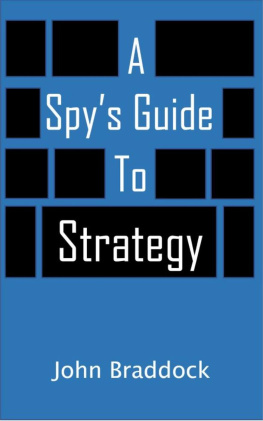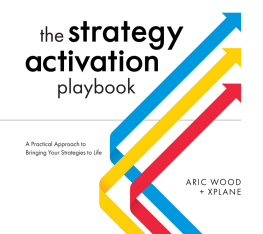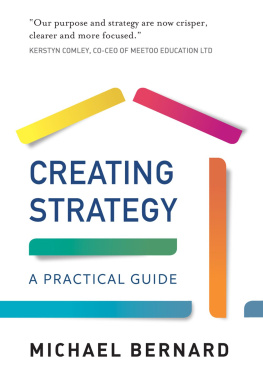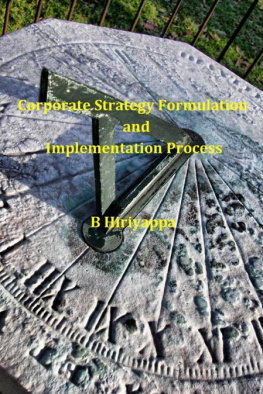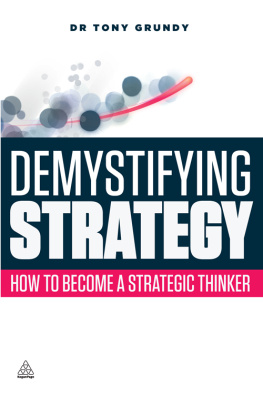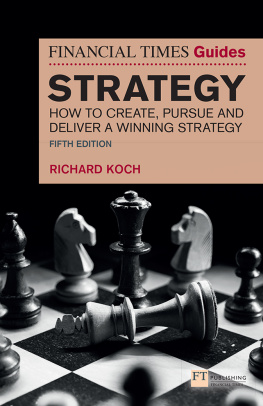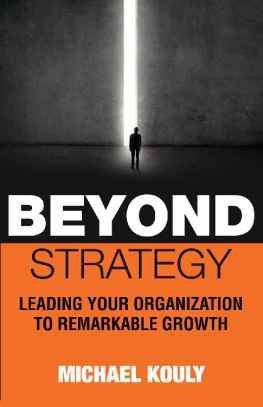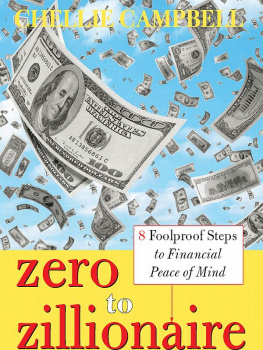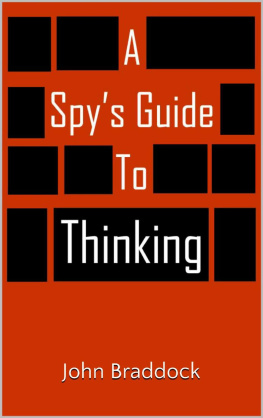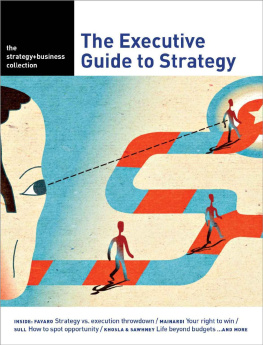A
Spys Guide
to
Strategy
by
John Braddock
Contact the author at
www.spysguide.com
This ebook is licensed for your personal enjoyment only. This ebook may not be re-sold or given away to other people. If you like to share this book with another person, please purchase an additional copy for each person you share it with.
Copyright 2017 John Braddock . All rights reserved. Including the right to reproduce this book or portions thereof, in any form. No part of this text may be reproduced in any form without the express written permission of the author.
This does not constitute an official release of CIA information. All statements of fact, opinion, or analysis expressed are those of the author and do not reflect the official positions or views of the Central Intelligence Agency (CIA) or any other U.S. Government agency. Nothing in the contents should be construed as asserting or implying U.S. Government authentication of information or CIA endorsement of the authors views. This material has been reviewed solely for classification.
Contents
Chapter 1: Strategy
Chapter 2: Games
Chapter 3: The Other Sides Strategy
Chapter 4: Your Strategy
W hat people do affects what other people do. Thomas Schelling
He told me a lie.
And then, more lies. A whole bunch of lies.
But that wasnt the problem.
Lies are normal, when youre a spy.
The problem was that it was the wrong kind of lie.
Usually, a spys lies:
- Conceal something and/or;
- Protect the spy.
Sometimes, a spys lies do both. But these lies didnt. They didnt do either one. They did the opposite.
The lies exposed him. And didnt protect him. The lies made things more dangerous.
Not just dangerous for him. Dangerous for me, too.
Which made me wonder if it was an accidental lie. Maybe it was a heat-of-the-moment kind of lie. Maybe it was an emotional lie. Maybe he lied from embarrassment. Or shame. Or insecurity.
Then, after he lied once, he had to lie again. And the second and third and fourth lies were told for the usual reasons. To conceal the first lie. To protect him.
Maybe thats what happened.
Whatever the reason, I had to do something about it.
He had lied. Now, it was my turn to act.
It was my turn to do something about it.
But first, I wanted to understand why. I wanted to understand the decision behind the lies.
You see the action of a lie and you take a step back in the Data-Analysis-Decision-Action sequence. You look at the decision to lie.
Then a step further back. What were his choices?
Then a step further back. What analysis led to that decision?
Then another step back. What information or data did he analyze to make the decision that led to that action?
Then you go back to the action and take a step forward.
What result did he expect from lying?
You look at intent.
Like the courts do. They dole out different punishments depending on why something happened. When someone gets killed, the courts want to know why.
They want to know intent.
Accidental? Negligent? If so, third-degree. A crime of passion? If so, second-degree. Maybe third. Malice aforethought? Cold-blooded and pre-meditated? First-degree. The worst kind.
It doesnt matter if the initial crime was third-degree if a worse one followed. You get judged on the worst one. If there was first-degree crime to cover up a third-degree crime, youre judged on the first-degree crime.
Which he had done. Whichever way they started out, his lies had become first-degree.
They were done on purpose.
Which meant intent.
And his intent mattered for a practical reason.
His intent was a clue to what he would do next.
I wanted to know how he would approach our next meeting. Would he come as a friend? Or an enemy? Or with a bunch of his friends, who would be a bunch of my enemies?
What would he do next?
A strategic question.
A strategic question because what he would do next mattered for what I would do next.
With strategic questions, you game them out. You predict what the other side will do if you do X. If you do Y, you imagine how theyll respond. You put it all together and choose the best path forward.
You build a strategy.
Which isnt difficult, if theres a predictable path for the other side.
Which there wasnt. Because there was a wrinkle with the lying source.
A wrinkle that took away the predictable path. A wrinkle that made it difficult to build a strategy.
The wrinkle was that the lying source knew that I knew he had lied.
He knew he had been caught. He knew that I knew.
Which meant he was thinking about what I would do next. He was thinking about whether I would do bad things.
He was thinking of worst-case scenarios.
He was thinking strategically, too.
Which meant he could deviate from a predictable path. And probably would.
Which was dangerous.
Because the worst-case scenarios in his head came from spy movies. From what spies in the movies would do. James Bond. Jason Bourne. Jack Bauer.
He had seen them all. He liked to quote them to me. He liked to compare what they did to what we were doing.
Which was a problem.
Movie spies hurt people. Sometimes, movie spies kill people. Sometimes, movie spies blow up whole villages. For less than what hed done.
Now, he was gaming out what I would do. Would I hurt him? Worse: Kill him? Worse still: Hurt his family?
I wouldnt. But he didnt know that.
Which was a problem.
A strategic problem.
After all, this guy wasnt a bureaucrat. He wasnt a businessman. He wasnt a normal guy.
He was a tough guy. Professionally.
Hed been in fights. Fights hed won. Fights hed lost.
He knew what fighters know: Whoever strikes first usually wins.
If he thought a fight was coming, hed make the first move.
Hed strike first.
Which meant I had two choices:
1.Wait for him to strike, or;
2.Strike before he did.
Which he knew.
If he thought Id choose option 2, hed go sooner. Hed strike before I could.
Which I knew.
It would be the logic of first strikes.
If we both thought a fight was coming, a fight was a certainty.[i] One of us would strike as soon as there was a chance.
Dangerous.
Which I knew. And he did, too.
Which meant I needed a good strategy.
For that, I had to see his strategy.
Because I missed it the first time.
I missed it completely.
F or most of the 20 th century, it was good to be an American. It was better being an American than being an African. Or an Asian. It was better than being from South America. Much better than being from Europe.
Then came the early 2000s, and it was especially good.
The Cold War was over. The Berlin Wall was gone. No risk of nuclear strikes. No concerns about invasion. No existential threats.
Plus, American influence was spreading. Which brought trade and technology and access to new horizons. Which meant it was even better to be an American. Conflicts were fading. Wealth was exploding, if you were an American.
Next page
